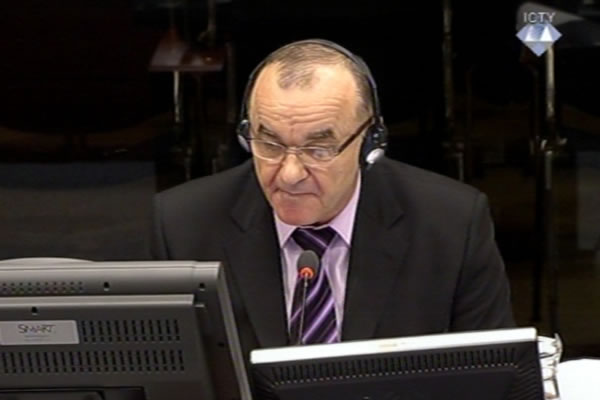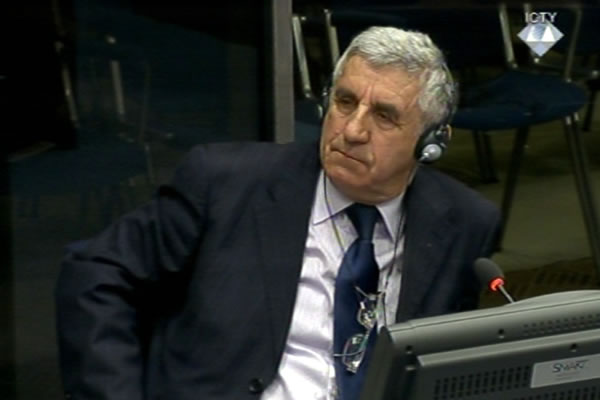Home
VERIFYING ‘RUMORS’ ABOUT CONDITIONS IN PRISON CAMPS
Tomislav Puhalac, who was deputy chief of the National Security Center in Lukavica during the war, and former assistant justice minister Slobodan Avlijas gave evidence at the trial of the former Republika Srpska president Radovan Karadzic. In 1992, Avlijas was instructed by the Justice Ministry and President Karadzic to verify ‘rumors’ about prison camps and horrible treatment of detainees throughout BH
 Tomislav Puhalac, defence witness of Radovan Karadzic
Tomislav Puhalac, defence witness of Radovan Karadzic Before the war, Tomislav Puhalac worked in the BH State Security Service. In his statement to Karadzic’s defense, Puhalac said that on 1 April 1992 he left Sarajevo ‘in fear’ for his family’s safety. Puhalac went to Sokolac where he joined the local department of the National Security Center. In August 1992, Puhalac was appointed deputy chief of the center in Lukavica.
In his statement, Puhalac said that after Alija Delimustafic was appointed the head of the BH MUP in 1991, the forces loyal to the SDA started arming up and restricting the participation of Serbs in the government. Muslims formed their paramilitary units, set up road blocks and made it impossible for Serbs to come to work. In April 1992, Muslims blocked the JNA military barracks and attacked Ilidza ‘torturing and killing’ Serbs who had remained in the city.
Prosecutor Edgerton put it to Puhalac that the real reason why he left Sarajevo was the cable in which Momcilo Mandic ordered the dissolution of the BH MUP; the cable was sent on 31 March 1992. The witness dismissed the suggestion. Although Puhalac claimed he had detailed knowledge of the Muslims’ efforts to obtain arms, he had no idea about the role the Serb police played in arming the Serbs. Puhalac admitted that in the months before the conflict he met in secret with his Serb colleagues. These were purportedly ‘spontaneous meetings’ where they discussed the safety of their families, Puhalac claimed.
In June 1992, Slobodan Avlijas, who was in the Justice Ministry at the time, went to Ilijas and Vogosca ‘on the instructions of the Ministry and President Karadzic’. Avlijas insisted on that point several times. He went there to check the ‘rumors’ and ‘bad stories’ in the Sarajevo media about the Muslim civilians who were allegedly detained and killed in those municipalities. Avlijas would later go to Prijedor, Vlasenica, Brcko, Zvornik, Hadzici and Ilidza with the same brief.
The witness described the situation in Vogosca and Ilijas as ‘critical’. In Vogosca, people were detained in an open bunker while in Ilijas they were crammed ‘like sardines’ in a warehouse. The situation was similar in Hadzici. Avlijas claimed that he immediately suggested to the Crisis Staffs that new locations should be found and the detainees transferred there. According to the witness, the new premises, in Planjina Kuca, met the international standards.
In the cross-examination, prosecutor Alan Tieger brought up the witness’s previous testimony at the Tribunal in the case against Stanisic and Zupljanin and at various trials before the BH State Court. As Tieger said, Avlijas held a meeting with the members of the Vogosca Crisis Staff in the Sonja café near the bunker where detainees were held in terrible conditions. Also, the prosecutor noted that Branko Vlaco, in charge of the detainees in the bunker, was later appointed warden in the Planjina Kuca prison. According to the witness, everybody, including interior minister Mandic, ‘knew Vlaco’s character’.
Avlijas remained adamant that Simo Drljaca, the Prijedor police chief, should have been arrested after the crime at Koricanske Stijene. The witness tried to justify the failure to arrest Drljaca, saying that Drljaca’s ‘public image was that of a great general’. ‘Tactical maneuvering was required’ for security reasons, the witness said. Prosecutor Tieger said that in his decree of 26 November 1993. Karadzic awarded the Petar Mrkonjic Medal to the Prijedor police station and the Karadjordje Star Medal to Simo Drljaca himself. ‘I didn’t know that’, Avlijas replied.
In the re-examination, the witness said that the ‘abundance’ of guidelines, decisions and instructions showed that Karadzic and the government tried hard to make the ‘state’ function according to the law. The witness also confirmed Karadzic’s old argument that Republika Srpska was set up ‘on a meadow’. As he was expounding on the difficulties they had faced, the witness at one point sighed deeply and said, ‘Oh, Radovan, my man…’
Photos
Linked Reports
- Case : Karadzic
- 2013-03-07 ‘POLICE SHOULD NOT INTERFERE’
- 2013-03-07 WERE SHELLS BROUGHT BY STORKS?
- 2013-03-06 NOBODY EXPELLED MUSLIMS AND THEY SHELLED THEMSELVES
- 2013-03-12 WHAT KARADZIC’S WITNESSES DIDN’T SEE
- 2013-03-13 HOUSEWIVES KNEW MORE THAN MUNICIPAL DEFENSE SECRETARY
- 2013-03-14 DEFENSE EXPERT: ‘DISTORTED PICTURE OF THE PAST’ AND ‘ERRONEOUS STATISTICS’

